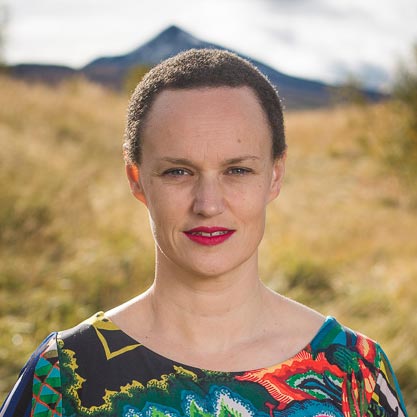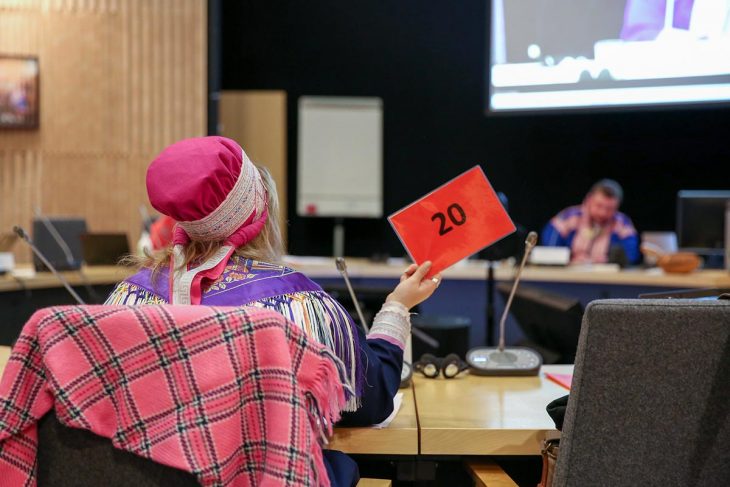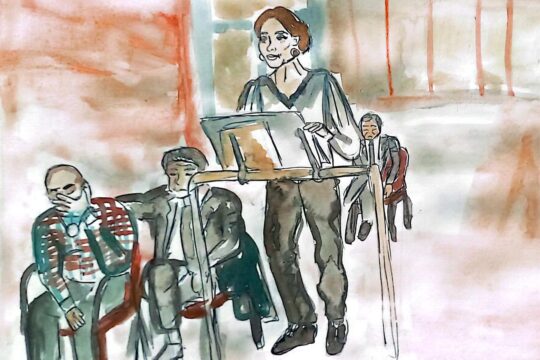A Truth and Reconciliation Commission (TRC) probing state-Sámi relations in Finland is preparing to restart its work after a timeout due to changes in its constellation. At the same time, the Finnish parliament debates the definition of Sámi – the Indigenous people that inhabits the northern parts of Finland, Norway, Sweden and a part of Russia – according to Finnish law. In November, the preparation for a new law regulating who can be registered as voters in the Sámi parliament elections in Finland turned into a source of conflict and mistrust between the Social Democrats and the Centre Party, both parts of the Finnish coalition government.
The main point of conflict concerns the definition of Sámi. Although there is no universally accepted definition, only those included on the official electoral register for the Sámi Parliament in Finland can vote or stand for election to that body. The new law would give the Sámi Parliament the exclusive power to define who can vote in the Sámi Parliament elections. But the centre-right Centre Party opposes it.
Two commissioners resign
The conflict concerning the definition will also be one of the most difficult questions for the TRC to deal with. The commission, that was appointed and about to start its work in the Fall of 2021, faced some major difficulties earlier this year after two commissioners resigned. The resignations happened amid protests at the Finnish government’s continuing negligence of the needs and rights of the Sámi in Finland, and the lack of adequate funding for the commission. The chair of the commission, Hannele Pokka, the former governor of the Province of Lapland (including the traditional Sámi home area), and the Finnish Minister of Justice between 1991 and 1994 (representing the Centre Party), has emphasized the importance of passing the electoral law for the future work of the commission. Pokka argues that a clear definition of who is Sámi in Finland would help the commission with its goal of improving relations between the Sámi and the Finnish State. Speaking to the Sámi section of the Finnish Broadcasting Company (YLE Sápmi), Pokka said the current debate and the government’s inability to pass the law was “unbelievable”.
Finnish Prime Minister Sanna Marin (Social Democrats) has promised to get the new law through Parliament, but her plans are obstructed by the intra-government opposition of the Centre Party. The Centre Party has built a political platform as the defenders of individuals who self-identify as Sámi but whom the majority on the Sámi Parliament do not recognise and some of whom they consider a threat to the integrity of the Sámi Parliament’s work in upholding Sámi culture and language. Currently, the country’s Supreme Administrative Court (SAC) can overturn the Sámi Parliament's decisions regarding voter registration. For previous elections, the court has added individuals to the voter register from the group of “non-recognised” Sámi.
UN human rights bodies criticize the Finnish government
The controversy regarding the Sámi electoral register has been rumbling for over a decade including various efforts to revise the law but the matter rarely takes centre stage in the national government.
The matter has also drawn the attention of the United Nations human rights monitoring system. The UN Committee on the Elimination of Racial Discrimination which monitors the Convention on the Elimination of All Forms of Racial Discrimination to which Finland has been a party since 1970 has criticized Finland and the SAC for limiting the self-governance of the Sámi by adding persons to the voter register without the consent of the Sámi Parliament. The Human Rights Committee that monitors States’ compliance with the binding International Covenant on Civil and Political Rights that Finland joined in 1975 has also expressed its views on the matter following a communication (a complaint) from Tiina Sanila-Aikio, former President of the Sámi Parliament.
Sanila-Aikio complained about the 2015 decisions of the SAC to add 93 persons to the electoral register whom the Sámi Parliament considered ineligible. She accepted that the Court held powers of review over the registration decisions of the Sámi Parliament. However, in the majority of the 93 cases, the persons who were added by the court did not fulfil the objective criteria specified in section 3 of the Finnish Act on the Sami Parliament.
The UN committee agreed with Sanila-Aikio that the Court’s actions in adding the names were “not based on reasonable and objective criteria.” Consequently, the court violated the Sámi People’s right to equal participation in democratic governance and to enjoyment of their culture, read in light of their rights to self-determination. The committee also referred to the principle in the UN Declaration on the Rights of Indigenous Peoples that they “have the right to determine their own identity or membership in accordance with their customs and traditions, and the right to determine the structures and to select the membership of their institutions in accordance with their own procedures.”
Sámi rights as pawns in the game of Finnish national politics?
With new parliamentary elections coming up in April 2023, both the Social Democrats and the Centre Party want to show their voters that they have political leverage concerning the new law regarding the Sámi Parliament. The unwillingness to compromise has risked the whole existence of the current coalition government, although so far, they are managing to ride out the political storm.
The situation has led to an unprecedented level of media coverage of a divisive political issue relating to the Sámi, normally given rather limited space in the national media. In November PM Marin brought the law to the Finnish Parliament against the will of the Centre Party. But political commentators seem to agree that she will face significant hurdles in obtaining the necessary parliamentary majority to deliver the promised revisions.

Otso Kortekangas is a postdoctoral researcher at Åbo Akademi University, Turku, Finland. He is involved in the project TRiNC: Truth & Reconciliation in the Nordic Countries led by Astrid Nonbo Andersen at the Danish Institute for International Studies (DIIS). His academic interests include educational history, environmental history, and Arctic and Sámi history.

Rachael Lorna Johnstone is Professor of Law at the University of Akureyri, Iceland and at Ilisimatusarfik, University of Greenland. She is working, inter alia, on the TRiNC: Truth & Reconciliation in the Nordic Countries project led by Astrid Nonbo Andersen at the Danish Institute for International Studies (DIIS). Professor Johnstone specialises in Polar law: the governance of the Arctic and the Antarctic under international and domestic law. She has published widely on the rights of Indigenous Peoples, international human rights law, governance of extractive industries in the Arctic, international environmental law, state responsibility and due diligence, and Arctic strategies.






